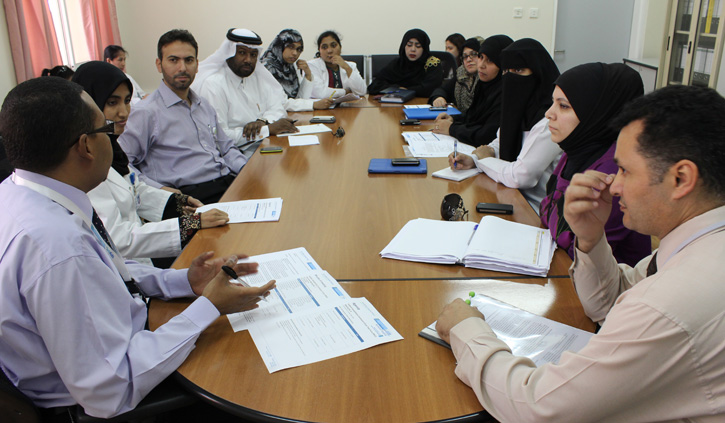
The vision driving the Pediatric Rehabilitation Continuum of Care (PRCC) Task Force is the commitment towards “achieving maximum potential together.” The PRCC Task Force was established in February 2012 to spearhead development and implementation of a Continuum of Care in Pediatric Rehabilitation, which is aligned with the mandate of HMC.
The task force membership is multi-disciplinary, comprising of physicians, nursing directors, head nurses and rehab chiefs. The task force co-established the Model of Care Working Group, which promotes collegiality amongst pediatric rehab supervisors and selected specialists. This working group aims to support and develop practice standards, policies and procedures, education and workforce planning, in relation to the implementation of the new model of care. Areas of focus were determined by the clinical leads – Dr. Haitham Elbashir, Dr. Nawal Al Haddad, Ms. Fatima Mustafa and Dr. Mahmoud Abeidah, in collaboration with visiting SMEs from The Hospital for Sick Children and Holland Bloorview Kids’ Rehabilitation Hospital.
The task force’s hard work, continued dedication and result-oriented approach have yielded many accomplishments. For instance, job descriptions were reviewed and job profiles were created to complement the redefined roles of the therapists. The task force is continuing to establish caseload management, which was reviewed using the standardized tool from CASLPA (Canadian Association of Speech Language Pathologists and Audiologists). In addition, process mapping sessions were conducted within each department to disseminate the proposed system workflow. Therapists and specialists have been actively involved in a series of acute and post-acute rehab education to further their expertise and skill set. The education mainly consisted of lectures, case presentations and clinical mentorship, which mostly crossed over two or more disciplines. These crossovers signified the beginning of inter-professional collaboration, not just with the leadership, but also with the therapists on the ground. Aside from the three rehab disciplines, the collaboration has also become evident in NICU. For example, the feeding therapists from OT and speech have started working with dieticians towards a cohesive intervention model to improve feeding and nutrition of infants with feeding difficulty. The team has reduced their process time by half and their progress is due to be reviewed by the Holland Bloorview Team in January 2013.
Planning for the upcoming year will incorporate Qatar’s National Strategy for Rehab, which is expected to be published in early 2013. The task force will work towards establishing sustainability of their progress in a multitude of education and inter-professional activities. This will consolidate the incremental changes in practice that are currently observed on the ground. Additionally, the clinical consolidation of skills will continue in order to ensure that the change in practice is sustained. Collectively, the work will be supported by evidences as a result of the outcomes evaluation, which is planned throughout the year.
Pediatric rehabilitation has indeed come a long way. However, they recognize that on the long and exciting journey to change, there is more work to be done. Supported by their vision, the task force will continue to work with the clinical team towards realizing their potential, while striving for the best in child-focused and family-centered care.
